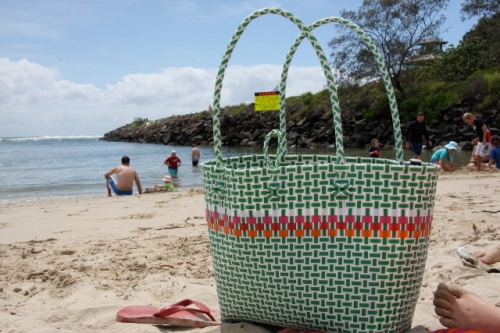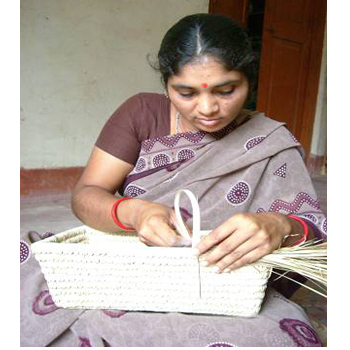This article was published in People Trends magazine VOL I.3 2009
which is a Singapore based magazine focusing on social issues.
Where Do FairTrade GoodsCome From?

Photos: Courtesy of Siham Craftlink, http://www.sihamcraftlink.com
WENDY BRUERE heads down to Bangladesh, one of the major producers of free trade goods, and speaks to some of the women who make a living out of fair trade.
An umbrella group of fair trade organisations, the Fairtrade Labeling Organisations, launched a
campaign this October urging consumers to pledge to spend $2 a day on fair trade goods for two weeks. This may be a nice way for someone to feel like they are making a difference while buying attractive products. But what does your cup of fair trade coffee or Oxfam tote bag actually
mean to the producers? Products come a long way, often from remote, struggling communities and are usually purchased by wealthy Westerners in big cities – although there is an emerging
fair trade market in Asian cities as well. As is the case for many goods in a globalised society, the producers and the consumers of fair trade goods live worlds apart. The difference with fair trade is that the consumers are aware of wanting to assist the producers, despite sometimes knowing
only a little about them. Modern ideas of fair trade originated in the 1940s with religious based groups. Ten Thousand Villages was one of the first fair trade organisations. It was founded in 1946
by Edna Ruth Byler, who according to the Ten Thousand Villages website, started by selling the goods out of her car boot in the United States. Later, the business she had begun was adopted by the Mennonite Central Committee. Ten Thousand Villages has now grown to be one of the
largest sellers of fair trade goods, and now stocks goods from artisans in nearly 40 countries. The organisation is also a founding member of the International Fair Trade Association (now the World Fair Trade Organisation). For a business to be regarded as fair trade, they must
abide by standards including fair wages for marginalised producers, as well as focusing on building skills, ensuring fair treatment of workers and aiming for long-term, sustainable trade relationships. Fair wages mean the producers earn enough for a sustainable livelihood – rather
than necessarily receiving the full retail value of their goods. There are umbrella organisations, such as the World Fair Trade Organisation, which register and monitor fair trade producers to ensure standards are recognised and maintained. Fair trade can refer both to products like handicrafts and to agricultural goods – fair trade coffee being one of the most well-known and best-selling, although other food items such as tea, cocoa, rice, honey and sugar can be found in fair trade form. Last year, I saw first-hand what fair trade can mean to producers when I worked with Tarango, a Bangladeshi non-governmental organisation committed to empowering marginalised women. The focus on women is a response to the nation’s deeply patriarchal society which tends to undervalue and disempower females. One of Tarango’s key programmes was a handicrafts programme where women – mainly impoverished, illiterate, rural women – were trained and assisted to make bags, baskets and other handicrafts under fair trade conditions.
Tarango then went on to sell these products on the international market. On a visit to a producer group in Kadambari, in the south of Bangladesh, I saw where the handicrafts were produced
and spoke with the artisans about how fair trade has affected their lives and their communities.
The jute baskets they weave are intricate and – possibly due to the assistance of external designers sourced by Tarango – very stylish and entirely suitable for modern tastes. Indeed, a UK-based fair trade wholesaler, Maison Bengal, sells Tarango goods to purely commercial boutique stores in the UK and Europe, and charges up to 60£ for baskets purchased directly from their website. But the world the producers lived in was very different to the one inhabited by people who shop at the London boutiques. It took almost a day to reach the village. Conditions were basic. Stores and kiosks were sparse. There was no bridge across the river that ran through the village – instead, rowboats ferried people back and forth. When I saw Tarango’s jute handicrafts being woven, I wondered whether the posh woman shopping at a London
boutique would be able to picture where the basket she purchased came from. Or, on another occasion, what she would think if she had seen the enthusiastic, dribbling toddler who had just been playing with the finished product. I also wondered if they would realise that that one basket
had given a woman – who had grown up with seemingly few prospects in a remote Bangladeshi village – one full day of meaningful, paid work. Tarango staff members whom I worked with in
Bangladesh spoke at length about how far the community had come in terms of wealth since the fair trade programme began, and how the women involved had gained confidence.
In addition to handicrafts, Tarango offers a microenterprise scheme where women can “graduate” from handicrafts to receive business training and small loans to establish their own businesses. We drank tea in a basic, but thriving Kadambari cafe run by one such woman. In Kadambari, I also met Pasful, a woman whose story appears on Tarango’s website (www.tarango-bd.com).
Married at 15, with only a Level 2 (lower primary school) education, she and her husband struggled to live on his income – less than US$1 a day between them. She initially started making jute handicrafts of her own volition, and later joined Tarango programmes which ensured fair pay
and training opportunities. Earning money meant she was able to send all her four children – including three daughters – to school. She also said that her husband was initially critical and mocked her when she said she could earn money from handicrafts. But now, he assists whenever he can and even does some of the housework to allow her more time to weave baskets – a rare
occurrence in a society as patriarchal as Bangladesh. When I met Pasful in Kadambari, she said she had now bought land, and added that the love between her and her husband had grown with her independence and income. Another group of women I met as they sat under a tree
weaving jute together, said that now they have work to do and they not only earn money, but they have a reason to sit together without their husbands and fathers asking them why they are leaving their houses. I was in Kadambari for International Women’s Day 2008, and Tarango had assisted the women from the village to organise a celebration. Along with speeches, music and dances, women from the village had organised performances and short skits they performed, some of which were entirely lighthearted and fun, some of which addressed serious topics such as domestic violence. This year for Women’s Day, the Kadambari women decided to celebrate with an all-female boat race. In an online description (endorsed by Tarango) of the event, many
men in the village were initially dubious about the event, voicing concerns about the women’s safety and boating ability. But the women insisted that it go ahead. Having spent seven months in Bangladesh, I know only too well how rare the kind of confidence it takes to perform in public and answer back to men for women in the country, and how valuable it is for them to gain it.
The next step in the cycle of Tarango’s handicrafts is through wholesalers before the bags and baskets can reach consumers. While organisations such as Ten Thousand Villages and Oxfam Trading have networks of shops to retail goods from their producer groups, many other smaller
organisations rely on wholesalers. Pam McGann from Siham Craftlink, a long established
importer and wholesaler of fair trade goods based in Australia, said she was inspired to start her business by the personal stories of the artisans she heard while working as a volunteer with World Vision in Melbourne selling fair trade handicrafts – something she began doing over 30 years ago.
“I knew how making their crafts and procuring markets for them had a positive impact on the lives of [the producers] and their children and gave them hope and dignity for the future,” she said.
To start her own business, she sourced producers through existing contacts and over the internet. Her producers are all accredited by fair trade monitoring organisations such as World Fair Trade Organisation and Bangladesh’s ECOTA Fair Trade Forum. She also travels to visit the producer groups she buys from to assess their fair trade credentials. “I ask questions and on my trips, I observe for myself,” she said. “I know of people who purchase from small groups that do not have the finance to be registered under fair trade. The individual buyer then does the followup to ensure that they follow ethical standards,” McGann added. (There are usually registration fees for producer groups or organisations applying for fair trade accreditation.) And fair trade is catching on. “From what I hear, fair trade is very well established in Europe, UK and USA,” McGann said, adding that momentum was building in Australia as well. “The awareness is there and the customer wants this… I believe it is now ‘in’ and fashionable and that is why there are eco-friendly fair trade shops springing up everywhere [in Australia],” she said. “Items of much better quality and more applicable to the Western market are now available which also is very positive.”
The Oxfam Hong Kong website reported that globally more than one million farmers and workers now make a good, sustainable living through fair trade. The site also said that about 2,700 companies have fair trade accreditation, and that annual sales of fair trade goods
“grew an average of 40% from 2004-2007” and that “[fair trade] cotton and tea sales doubled from 2007 to 2008.” Even Nestlé – a company once reviled by social activists for its unethical practices in aggressively marketing infant formula in developing countries –launched a fair trade
instant coffee in 2005, demonstrating a clear move into the mainstream for fair trade. The Oxfam Hong Kong website also reported on the growing awareness of the importance and relevance of fair trade in Hong Kong, showing that fair trade is making inroads into Asian markets as well as Western ones. According to the site, there are now 110 outlets and cafes selling and serving fair trade food and beverages in Hong Kong, and about 260 fair trade products are available in
the country – up from 25 in 2005.In Singapore, fair trade coffee can be bought at Starbucks and at some supermarkets. But there is not yet the same range of fair trades on offer as in some other
parts of the world. People wanting to buy fair trade goods shouldn’t be discouraged though – if the trend towards fair trade keeps growing, you may not have long to wait. And until then, there are plenty of online fair trade shops, including Oxfam Trading and Ten Thousand Villages. See http://www.tenthousandvillages.com and http://www.oxfamshop.org.au for more information on fair trade goods.
Photos: Courtesy of Siham Craftlink, http://www.sihamcraftlink.com
Read Full Post »















